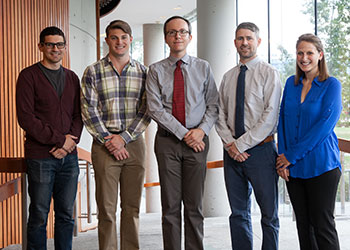

Community Connections
Forging Long-Term Patient Relationships through PACt
Fourth-year medical students Hannah Rosenblum and Kevin O’Laughlin noticed that there were few opportunities to form long-term relationships with patients during the first year at Einstein.
“During our Introduction to Clinical Medicine course, we typically had the opportunity to meet with each patient only one time, in order to practice interview skills,” explained Ms. Rosenblum.
This didn’t sit well with the two former social justice activists. Ms. Rosenblum, who had worked at the Urban Justice Center through AVODAH: the Jewish Service Corps, and Mr. O’Laughlin, who had served with the Peace Corps, wanted to be able to form stronger relationships with patients. They also wanted to learn about social determinants of health, patient advocacy and care coordination for those struggling with chronic illness in the Bronx.
Connecting the Dots
The students first sought advice from Dr. Michael Reichgott, professor of medicine, who helped them structure their idea into Einstein’s Patient Advocate Connection (PACt), a unique Community Based Service Learning (CBSL) program that connects students with patients over an 18-month period.
“We wanted to bring together students and faculty who are interested in both discussing the social determinants of health and in furthering understanding of these factors,” said the pair regarding the program’s beginnings. “We created PACt in hopes of filling a need for a more long-term, community-based effort with patients.”
To put their idea into action the students then met with Dr. William Jordan, assistant professor of family and social medicine (FSM) at Einstein, Dr. Deborah Swiderski, associate professor of clinical medicine and of clinical family & social medicine and an attending physician at Montefiore Medical Center, and Dr. Victoria Gorski, associate professor of clinical family & social medicine at Einstein and director of education and program development FSM, at Montefiore. Dr. Jordan serves as the project’s faculty advisor, while Drs. Swiderski and Gorski offer mentoring to students who take part in PACt.

PACt Leadership, Past and Present: (From left) Kevin Jordan, Jacob Taylor, Dr. William Jordan, Kevin O’Laughlin and Hannah RosenblumOnce they had a plan in place, the duo reached out to their classmates. Eighteen signed on to take part in the pilot of the program, and new students have signed on each of the two subsequent years to serve within the community through the program. (This year, 13 students are actively involved with PACt.)
Making a Difference in the Field
PACt offers students the chance to form powerful bonds with the community members they meet, who are patients treated at clinics associated with Montefiore, Einstein’s University Hospital. A pair of students is assigned to each patient participant.
Through their involvement in PACt, students come face to face with their patients on a more intimate and human level, getting to witness daily housing issues, food shortages and transportation problems, while assisting the individuals in addressing their respective health concerns. This experience is important because it provides a foundation they will need as professionals for establishing effective relationships with patients, which will include following up with patients throughout the course of their care and having an understanding of the kind of obstacles that could interfere with a patient’s access to care.
“While the program is still small, the interactions between students and community members have had benefits for both,” observed Dr. Jordan, who also serves as co-director of medical student education in family and social medicine at Montefiore/Einstein. “One of the patients in the program successfully completed treatment for hepatitis C with support from the pair of students assigned to him, while another attended his first Alcoholics Anonymous meeting accompanied by the pair working with him.”
The program complements students’ educational experiences by providing them with real-world opportunities through which to apply their skills in addressing primary care shortages in their own community.
“Many patients in the Bronx face any number of social or economic hardships, and frankly, many students come to Einstein simply not knowing what it’s like to live like that,” said Kevin Jordan, a second-year student who is a part of PACt’s current leadership (and no relation to Dr. Jordan). “PACt is great because it allows students to jump in and get in the trenches.”
What Tomorrow May Bring
As the program has matured, PACt members have begun to consider the broader ramifications that the program may have, such as its effect on student choice of specialty, illuminating a desire to work with the underserved, understanding the need for empathy and raising awareness of implicit bias among students, as well as issues such as social isolation, healthcare utilization and health outcomes among patients.
For now, the program will continue to connect pairs of interested students with patients in the Bronx for 18-month periods that allow students to forge a doctor-patient relationship with community members, while also exploring social determinants of health among these individuals.
Dr. Jordan holds even higher hopes for the program in the future. “As we firmly establish the value of this volunteer program, I look forward to finding it a permanent home in the formal curriculum,” he said.
Posted on: Monday, November 10, 2014

Tablet Blog